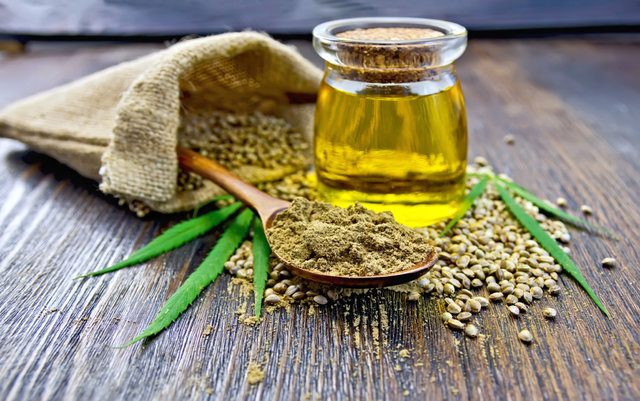Although the research is often confusing, inconsistent, or limited by policy or funding constraints, user reports and many privately-sponsored studies indicate positive effects of CBD oil pretty much across the board. Even the United States National Institute on Drug Abuse (NIDA) has conceded the drug has huge therapeutic potential in several medical fields.
So what is CBD oil? CBD is short for cannabidiol, one of over a hundred cannabinoids found in marijuana. It is found in both Cannabis sativa, commonly known as hemp, and Cannabis indica, the species from which most recreational and medical cannabis is derived.
Hemp, on the other hand, contains mostly CBD with little to no THC. In the U.S., hemp is legally defined as any cannabis plant with less than 0.3% THC. CBD oil is extracted from either whole hemp or marijuana plants, leaves and stems included (not to be confused with hemp oil, which is made only from seeds and contains neither THC nor CBD).
Now that you know what it is, check out a few of its uses and you’ll understand why it’s the latest craze.
1) Naturally manage stress
Rates of anxiety disorders in the U.S. have been skyrocketing for the last 8 years, and traditional medications come with certain risks, including dependency and overdose.
As one CBD entrepreneur suffering from PTSD told the UK’s Guardian newspaper, using cannabidiol rather than marijuana or even drinking is a healthier way to “take the edge off” in today’s hectic world.
CBD oil’s effects are both anxiolytic and adaptogenic, meaning it relieves anxiety in the moment but also helps regulate the body’s stress response over time.
2) Soothe your aches and pains
One of the most common uses for CBD oil is as an analgesic, or pain reliever. CBD helps to relieve pain by interacting with opioid receptors in the brain, and also by reducing inflammation.
CBD oil can be applied topically (on its own or in a lotion) to be absorbed through the skin and target sore muscles after a workout, bumps and bruises, or aching joints. It can also be taken orally in a dropper for headache and migraine relief.
There is evidence from NIDA and others that it can be used in place of or in combination with traditional pain relievers to treat chronic pain like arthritis. Both NSAIDS and opioids can cause liver damage among other dangerous side effects when taken over a long period of time.
3) Fight inflammation
Swelling, redness, heartburn, fever, eczema – all of them share one culprit: inflammation. Inflammation is the body’s response to injury or infection; the heat and pain associated with skin rashes or acid reflux for example are caused by white blood cells and immune cells rushing to the area.
However, inflammation is also uncomfortable and can be harmful on its own. One medical review stated cannabinoids have “novel anti-inflammatory” properties that are effective all over the body, from respiratory irritation to liver cirrhosis and gastrointestinal diseases.
4) Break bad habits
In its testimony to Congress, NIDA cited a study where CBD helped mitigate drug-seeking behavior in heroin-addicted test animals, and also reduced the pleasure-reward effects of some narcotics. This may be similar to the way CBD inhibits the “high” associated with THC in whole marijuana.
A more recent study reported by CNN in May found that CBD alone reduced or even eliminated the cravings and anxiety that make it so hard for opioid addicts to tolerate withdrawal.
If this is true, then it’s likely that CBD could be helpful in quitting tobacco and other addictions, potentially even compulsive behaviors like overspending or nail-biting.
5) Keep a healthy – well, everything
The Guardian’s expose also delved into CBD’s use as an antipsychotic, with some research suggesting it could add up to 20 years to the lives of patients with psychosis. Psychotic episodes are prevalent in neurological disorders like schizophrenia and flood the brain with toxic chemicals.
Both government and private studies have concluded that CBD reduces neurotoxicity and protects the body’s cells from degradation, too.
CBD’s antioxidant effects defend against the degenerating effects of Alzheimer’s disease, epilepsy, multiple sclerosis, Parkinson’s, and more. In oncological trials, CBD is shown to kill cancer cells, inhibit tumor growth, and unlike chemotherapy does not destroy healthy cells.
Of course, anyone can reap the neuroprotective rewards of CBD oil (provided it’s available in your state!) – no chronic disease necessary.
With prescription drug companies becoming ever more untrustworthy, it’s no wonder CBD is fast becoming a top choice for treating specific ailments as well as maintaining overall health. It has virtually no side effects, takes no significant toll on the body, and has been found effective for treating maladies ranging from acne to epilepsy to cancer. Try it and see – you’ll be clearing out your over-the-counter meds in no time.
Disclaimer: This article is intended for information and entertainment purposes only and is not intended to reflect the specific views of the publication.






